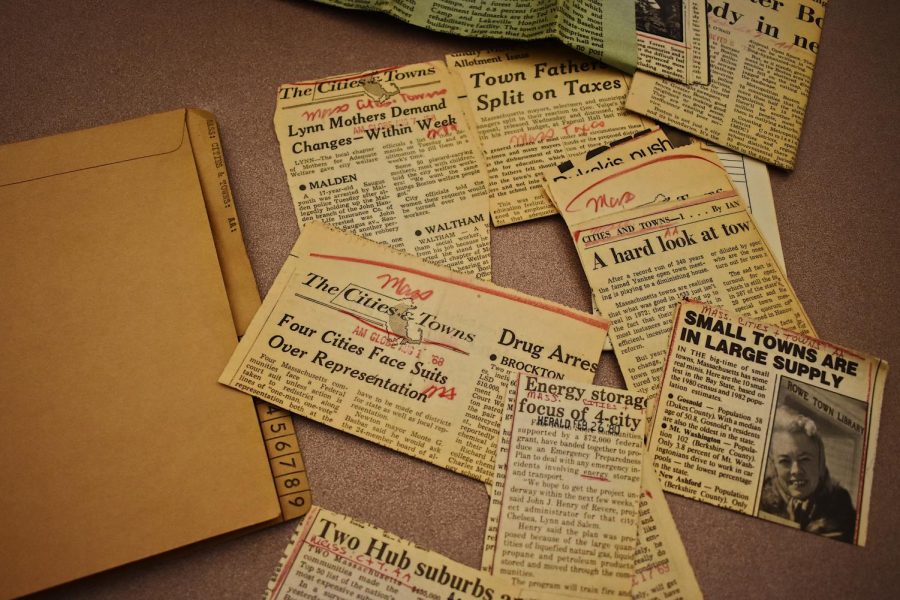Snell archives strengthen students’ connection to history
Boston Globe clippings are one of the many offerings in the archives department.
October 3, 2019
Nestled in the basement of Snell Library, the Archives and Special Collections Department serves as a link to the past and a bridge to the future for students and communities in Boston and abroad.
Housing a wealth of physical and digital documents, books, newspapers, photographs and other materials, the department has two main missions. The archives hold the university’s historical documents. The special collections contain records of Northeastern’s surrounding neighborhoods and communities, focusing on the African American, Latinx, LGBTQ+ and Asian American communities as well as related social justice and civic action groups.
The archives and special collections act as a point of convergence for students, professors, researchers and community members to deepen their understanding of history.
In their mission to document Boston’s communities, the special collections adopts larger projects such as the Lower Roxbury Black History project, an oral history collection of residents’ memories of the neighborhood.
Molly Brown, the department’s reference and outreach archivist, said the project mentions community locations like Carter Playground. “It’s a really cool way to get to know the sights you’re seeing and the impact they had on other people’s lives,” she said.
The archives and special collections also allow community members to revisit historical moments they or family members were part of.
“What is kind of special about our records is that a lot of the people that have deposited records are still living today… Their impact is still very recent,” Brown said.
Additionally, the archives function as a powerful tool for researchers to reevaluate and form a stronger connection with the past.
Nicole Aljoe, director of the Africana Studies Program and associate professor of English at Northeastern, helped create the Early Caribbean Digital Archive, or ECDA, in collaboration with Elizabeth Maddock Dillon, professor in and chair of the English department.
When the two attended a symposium in Barbados in 2011, they noticed that the island’s paper documents, some up to 300 years old, had begun to disintegrate, and the historical societies and libraries holding them lacked the resources to move to a digitized system.
Observing the lack of accessibility this situation posed to scholars, they created the ECDA, a collection of pre-20th century Caribbean materials, including slave narratives and runaway slave ads, that has been utilized by students and scholars alike.
Alanna Prince, a third-year English doctorate student, said she began working with the ECDA as part of her stipended graduate assistantship and now acts as a project manager for the archive.
Additionally, Prince said she is involved with the Early Black Boston Digital Almanac and the Margaret Fuller Archive Transnational Archive, as well as assisting with a teaching network, which helps instructors improve how they teach first-year writing classes and allows her to share the archives’ resources with others on campus.
“I sometimes worry that [the archives] go under-used. Part of what I want to do in a teaching network is let students know this really cool stuff exists,” Prince said.
The archives also help students, especially those interested in social justice and activism, familiarize themselves with Boston. The department hosts public events related to their collections and community initiatives. Their series “Neighborhood Matters” recently brought in activists from Boston’s Female Liberation movement to share stories of their experiences in the late 1960s and early 1970s with the community.
For students with other interests, the special collections holds a repository of rare books. The department’s oldest piece is the Dragon Prayer Book, a palm-sized, sheepskin-bound prayer book from the 15th century that was used by Dominican nuns in Germany. An exhibit featuring research done on the book is currently on display in the Snell lobby and several events related to the book are planned for upcoming months.
Brown suggested that students should head down to the department during finals week as a respite from the drudgery of studying.
“Archives are a great place to get a break from looking at a computer screen. It’s a really nice time to feel something tangible and explore them in that way,” she said.
Brown said getting involved with the archives has a “pretty easy barrier to entry.” She said she encourages students to visit and take a look at the materials, even if they don’t have a specific research topic in mind.
“All are welcome here,” said Brown. “I want people to creatively think about how they are represented in the archives, or how the archives can kind of feed the life that they’re living now.”


















